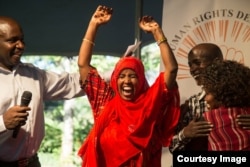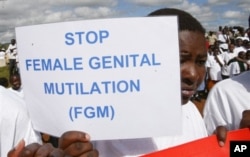Rahma Wako, 50, is an activist working to eradicate FGM 16 years after Kenya banned the practice — and 44 years after she suffered through the excruciating procedure.
“I was cut and sewn at the age of six," says Rahma. "After one week, they used a hot iron rod to heat the place where they cut. I took 40 days to heal. In the 40 days, I could not go to the toilet properly. I could not do anything properly. Things got better after the 40 days. This is a memory even at 100 years old can never go away for anyone.”
Six years later, her parents married her to a 70-year-old man. Rahma delivered twins nine months later in what she says was a near-death experience.
“It was a painful experience. They tore me up like a piece of cloth," says Rahma. "This is because during the FGM — they had sewn me up so tight. They had to sew me up...At the end, I had around 28 stitches.”
After six months, Rahma was pregnant again with twins. She decided to leave her home, filed for divorce, won the case, and gained custody of her four children.
She swore never to become anyone's wife again and to become an anti-GM campaigner.
Female genital mutilation in Africa is an age-old tradition that involves the cutting of the clitoris of young girls and women.
The United Nations estimates at least 200 million girls and women have undergone some form of FGM, including 44 million aged 14 years and younger.
The 2016 UNICEF report said girls and women in 30 countries have been subjected to FGM, more than half from Indonesia, Egypt and Ethiopia.
In Kenya three percent of girls under age 15 have been subjected to FGM. The practice was outlawed in the country in 2001. Those found to be performing FGM can be imprisoned for up to three years.
The practice is usually performed by people who are not trained medical professionals, posing risk of death from excessive bleeding or infection. Later, FGM can cause intense pain during sexual intercourse and complications during deliveries.
Rahma says she has prevented hundreds of girls from being cut.
“I was an outcast in my community, fighting against my own culture," she says. "This gave me more energy to fight for the girl child. I prevented so many girls from undergoing the cut and experiencing all that I had experienced.”
Today, Rahma travels to areas where the practice is most prevalent and says she finds that more people are starting to slowly shun the practice.













